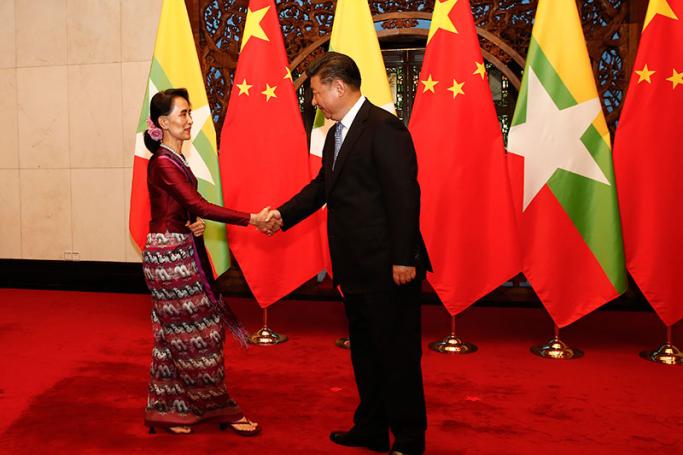It has been over a year since the National League for Democracy (NLD) came to power under the leadership of Aung San Suu Kyi in Myanmar. The ruling party and its leader have gone through numerous trials and tribulations since taking office. Though the NLD government has made immense progress in the face of domestic and foreign obstacles, there are also missteps and deficiencies in its governance.
There are many challenges awaiting Suu Kyi in the near future. As a close neighbor, China's assistance is indispensable.
Views on the governance of Suu Kyi and the NLD differ greatly among the Myanmese public. U Tin Oo, honorary chairman of the NLD, claimed recently that the government has made immense progress in its first year. His view is contradicted by a few Myanmar's media outlets who regard the NLD as inexperienced. Some objective observers and political analysts, however, consider the first year of the NLD administration is adequate.
The divergence in public opinion became apparent in the by-elections for 19 vacant parliamentary seats held on April 1. Although the NLD was victorious, it only gained 9 seats out of 19. The ethnic parties and the former ruling party, the Union Solidarity and Development Party, have all expanded their clout after the by-election. This reveals that the approval rate of Suu Kyi and the NLD has declined.
The relationship between the military and the government was the main issue facing the NLD after it assumed power. Win Htein, a central executive committee member of the NLD, believes that there were no conflicts between his party and the military. Instead, they have deepened their understanding of each other. But in fact, the two sides have conflicting interests and demands. In the long term, if the NLD fulfills its promises to amend the constitution, under which the interests of the military will be impaired, clashes are bound to occur between the two.
Promoting ethnic reconciliation through the 21st Century Panglong Conference is a laudable effort for the NLD. Suu Kyi has attached great importance to promoting national peace and reconciliation. However, she is held back by domestic politics. There are still huge divisions among the government, the military and the ethnic armed forces. The time for the second 21st Century Panglong Conference were postponed several times until it was decided to be held on May 24.
There are also progress and challenges in Myanmar's foreign policies. The NLD government has given top priority to the relationship with ASEAN, while at the same time attaching importance to peripheral countries and trying to maintain a balance between China and the US.
Such a pragmatic diplomacy not only helps Myanmar create more favorable regional and international conditions for its domestic development, but also helps the NLD government make a good impression in the international arena.
However, the NLD government faces great pressure from the international community over the Rohingya issue and conflicts in northern Myanmar. The NLD government is also under fire for the country's economic development. According to the World Bank, Kyats, Myanmar's currency, has depreciated 14 percent in the past year. Myanmar's economic growth slowed down to 6.5 percent in the fiscal year 2016-17 from 7.3 percent in the previous fiscal year.
Therefore, there is a mixture of success and failures in the NLD's governance. The NLD government needs to accumulate experiences and find solutions to conundrums the country is facing. However, it's unfair to expect it to solve all the problems within just a year.
As a matter of fact, the NLD has been on the right path to reform the political system, improve relations among ethnic groups, and boost the economy, all of which would aid Myanmar in its path toward a healthy and stable future. However, Suu Kyi and the NLD government only have four years to realize their goals, so assistance from China is crucial.
China's One Belt and One Road initiative coincides with Myanmar's plans to invigorate the economy and improve the living standards of its people. Beijing maintains a close relationship with Nay Pyi Taw and its military, and also can exert certain influences over the ethnic armed forces in northern Myanmar. Therefore, China can play a positive role in promoting a stable relationship between the NLD government and the military, as well as Myanmar's national reconciliation.
As an important neighbor, China is looking forward to a prosperous, united and stable Myanmar. It is also the desire of the NLD government and the Myanmese public. Together, the two countries can work to dispel prejudices and deepen cooperation, and promote Myanmar's economic and social development as well as national progress.
The author is a research fellow with the Charhar Institute and the College of ASEAN Studies at Guangxi University for Nationalities.
Courtesy Global Times
You are viewing the old site.
Please update your bookmark to https://eng.mizzima.com.
Mizzima Weekly Magazine Issue...
14 December 2023
Spring Revolution Daily News f...
13 December 2023
New UK Burma sanctions welcome...
13 December 2023
Spring Revolution Daily News f...
12 December 2023
Spring Revolution Daily News f...
11 December 2023
Spring Revolution Daily News f...
08 December 2023
Spring Revolution Daily News f...
07 December 2023
Diaspora journalists increasin...
07 December 2023
Mizzima interview with Mr Adriano Campolina, Chief Executive, Action Aid International












